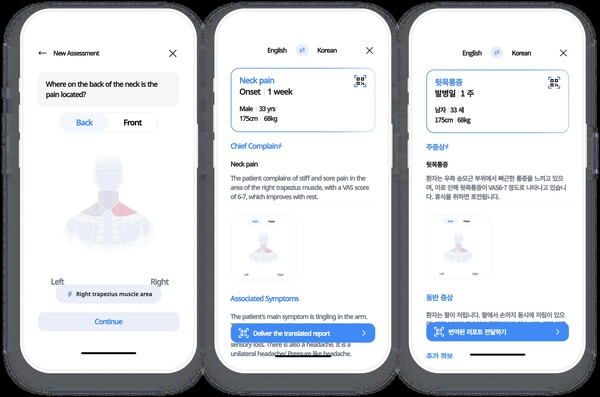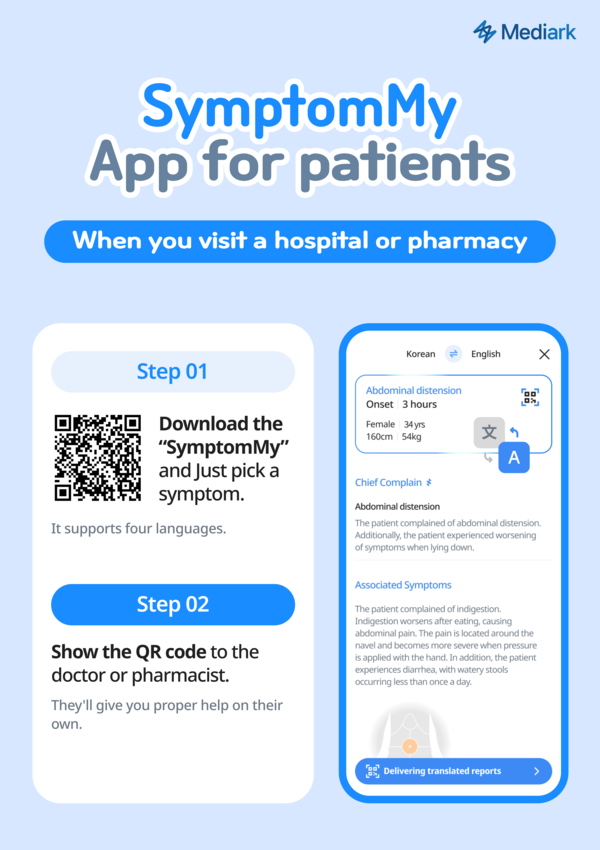One of the biggest frustrations for expatriates in Korea is accessing healthcare because of the language barrier.
"I struggled to articulate my pain, and I was hesitant, so initially, I avoided going to the hospital," shared Nazokat Mamadalieva, 29, who arrived in Seoul from Uzbekistan in September. For approximately three months, she sought assistance from Korean acquaintances to facilitate her visits to the doctor.
As the number of foreigners living in Korea increases, there are calls for efforts to improve access to healthcare for foreign patients. In particular, foreigners who are not fluent in Korean may have difficulty explaining their symptoms and may be turned away at the hospital door.
According to Statistics Korea's 2022 survey on immigrants' living conditions and labor force, 33.7 percent of foreigners who did not go to the hospital cited the language barrier as the reason.
In response, Incheon Metropolitan City and digital healthcare company, Mediark, recently partnered to launch SymptomMy, an AI pre-questionnaire mobile application to improve healthcare access for expats with limited Korean language skills.

SymptomMy's main feature is its AI questionnaire system. It guides users through selecting a main symptom, detailing its duration, listing accompanying symptoms, inquiring about past medical history, family history, and medications, pinpointing the location of pain, and gauging its intensity. The AI then organizes the analysis results into a report, which can be translated into foreign languages, including Korean. Additionally, it introduces medical specialties related to the condition and helps users find nearby clinics through a map.
The app currently supports Korean, English, Chinese, and Vietnamese, and Russian is in development.
The questionnaire system is based on an algorithm developed by Mediak CEO Lee Chan-hyung when he was a military doctor.
"When I was a military doctor, I developed the questionnaire system after seeing that the military medical system was outdated and had many vulnerabilities and accidents," Lee said.
"After leaving the military, I realized that many foreigners could not go to the hospital due to language barriers. Even if they did, there was a lack of communication, resulting in misdiagnosis and incorrect prescriptions. In response, I added a questionnaire summary system and translation system to the app."
The issue of foreigners' access to healthcare was also a major concern for Incheon Metropolitan City. Incheon is home to Incheon International Airport, and the number of foreign residents has doubled in 10 years to 146,885 last year.
"There are many multicultural families in Incheon, and there are many foreign tourists due to the presence of Incheon International Airport," said Kim Ju-young, an official from the Data Industry Division of AI Convergence at Incheon Metropolitan City. "In the field, I heard foreigners often ask Korean friends to go to the hospital with them, saying that it is difficult for them to go to the hospital alone because their Korean is not good enough."
"It is important for doctors and pharmacists to welcome foreigners without rejecting them," said Kim. "If they are unfamiliar with foreigners or reject them, they may not be able to receive proper treatment even if they bring their Symtommy app. Therefore, we are planning to conduct related education through the medical and pharmaceutical societies in December."

Although the main target of Symtommy is expats, Lee said that it can be used by Koreans as well, so they want to develop it into a universal system. Furthermore, the ultimate goal is to contribute to improving the medical system worldwide.
"Even for Koreans, it is difficult to determine which department to go to when sick. We are currently targeting foreigners, but we are developing it so that it can be used universally everywhere," Lee added. "At the hospital, about 30 percent of the time is spent on questionnaires and 15 percent on writing records. Our goal is to streamline diagnosis and ultimately improve the medical system through a preliminary questionnaire and diagnosis system."

